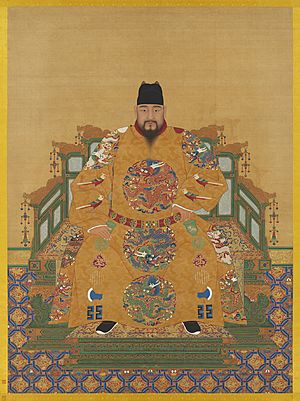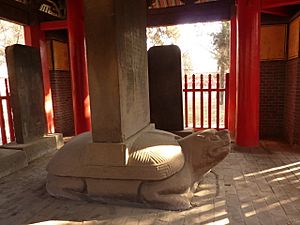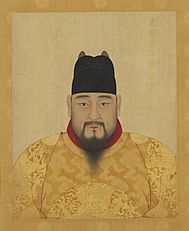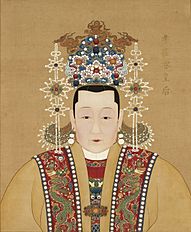Emperor Yingzong of Ming facts for kids
Quick facts for kids Emperor Yingzong of Ming明英宗 |
|||||||||||||||||
|---|---|---|---|---|---|---|---|---|---|---|---|---|---|---|---|---|---|
| Emperor Emeritus (1449–1457) | |||||||||||||||||

|
|||||||||||||||||
| 6th and 8th Emperor of the Ming dynasty | |||||||||||||||||
| First reign | 7 February 1435 – 1 September 1449 | ||||||||||||||||
| Enthronement | 7 February 1435 | ||||||||||||||||
| Predecessor | Xuande Emperor | ||||||||||||||||
| Successor | Jingtai Emperor | ||||||||||||||||
| Regents |
See list
Grand Empress Dowager Zhang (1435–1442)
Yang Shiqi (1435–1442) Yang Rong (1435–1438) Yang Pu (1435–1442) Zhang Fu (1435–1442) |
||||||||||||||||
| Second reign | 11 February 1457 – 23 February 1464 | ||||||||||||||||
| Predecessor | Jingtai Emperor | ||||||||||||||||
| Successor | Chenghua Emperor | ||||||||||||||||
| Crown Prince of the Ming dynasty | |||||||||||||||||
| Tenure | 1428–1435 | ||||||||||||||||
| Predecessor | Crown Prince Zhu Zhanji | ||||||||||||||||
| Successor | Crown Prince Zhu Jianshen | ||||||||||||||||
| Born | 29 November 1427 Xuande 2, 11th day of the 11th month (宣德二年十一月十一日) |
||||||||||||||||
| Died | 23 February 1464 (aged 36) Tianshun 8, 17th day of the 1st month (天順八年正月十七日) |
||||||||||||||||
| Burial | Yuling Mausoleum, Ming tombs, Beijing | ||||||||||||||||
| Consorts |
Empress Xiaozhuangrui
(m. 1442–1464)Empress Xiaosu
(before 1464) |
||||||||||||||||
| Issue |
|
||||||||||||||||
|
|||||||||||||||||
| House | House of Zhu | ||||||||||||||||
| Dynasty | Ming dynasty | ||||||||||||||||
| Father | Xuande Emperor | ||||||||||||||||
| Mother | Empress Xiaogongzhang | ||||||||||||||||
Emperor Yingzong of Ming (born Zhu Qizhen) was an important ruler of the Ming dynasty in China. He was the sixth and then the eighth emperor. He first became emperor in 1435, known as the Zhengtong Emperor. But in 1449, he was captured by the Mongols during a big battle called the Tumu Crisis. Because of this, he had to give up his throne to his younger brother, the Jingtai Emperor.
Later, in 1457, he managed to take back the throne from his brother. He then ruled again as the Tianshun Emperor until he died in 1464.
Contents
First Time as Emperor
Zhu Qizhen was the son of the Xuande Emperor and Empress Sun. He became emperor when he was only eight years old. This made him the first child emperor of the Ming dynasty.
At the start of his rule, the Ming dynasty was doing very well. This was thanks to his father's good leadership. Because he was so young, Emperor Zhengtong was easily influenced by others. He especially listened to a powerful palace official named Wang Zhen.
At first, Wang Zhen's power was kept in check. This was done by the emperor's grandmother, Grand Empress Dowager Zhang. She worked closely with three important ministers. But in 1442, Empress Zhang passed away. Around the same time, the three ministers also died or retired. After this, the emperor started to rely completely on Wang Zhen for all his decisions.
Captured by the Mongols
When Emperor Zhengtong was 21, in 1449, he decided to lead his army himself. This was against the advice of many of his officials. He was advised by Wang Zhen to fight the Mongols. This led to a terrible defeat at the Battle of Tumu Fortress.
In this battle, the Ming army, which had half a million soldiers, was crushed. The Mongol forces, led by Esen Taishi, had only about 20,000 cavalry. The emperor was captured by the enemy. This event shook the entire empire. It almost caused the Ming dynasty to fall apart. Luckily, a very capable minister named Yu Qian stepped up. He was responsible for defending the capital city, Beijing.
Even though he was a prisoner, Emperor Zhengtong became friends with the Mongol leaders. Meanwhile, back in China, his younger brother, Zhu Qiyu, was made the new emperor. He became known as the Jingtai Emperor. This meant that Zhengtong was no longer the emperor. He was given the title of Emperor Emeritus.
Historians at the time called this period of his life the "Northern Hunt." This was to avoid saying that the country's leader had been captured in war.
House Arrest and Second Reign
Emperor Zhengtong was released by the Mongols one year later, in 1450. But when he returned to China, his brother, the Jingtai Emperor, put him under house arrest. He was kept in the southern palace of the Forbidden City for almost seven years. His contacts with the outside world were severely limited.
His son, who would later become the Chenghua Emperor, was also affected. He was removed as the crown prince. The Jingtai Emperor wanted his own son to be the next emperor. This made the former Zhengtong Emperor very upset. However, the Jingtai Emperor's son died soon after.
The Jingtai Emperor became very ill from grief. Seeing this chance, the former Zhengtong Emperor decided to take back the throne. He launched a palace coup while his brother was sick. He successfully seized the throne. He then changed his regnal name to "Tianshun," which means "obedience to Heaven." He ruled for another seven years. The Jingtai Emperor was demoted and put under house arrest. He died soon after, possibly murdered.

On August 6, 1461, the Tianshun Emperor issued an order. It warned his people to be loyal and follow the laws. This was a warning to a general named Cao Qin. Cao Qin had caused trouble by having one of his men kill someone. This person was being questioned about Cao Qin's illegal business deals.
On August 7, 1461, Cao Qin and his group tried to overthrow the Tianshun Emperor. But the emperor was warned by loyal generals. The emperor and his court quickly prepared for a fight. They closed the palace gates. During the attack on the capital city, some officials were killed. The rebels also set fire to the gates of the Forbidden City. Luckily, heavy rain put out the fires. The fight lasted almost all day. Cao Qin's brothers were killed, and Cao Qin himself was wounded.
Emperor Tianshun died in 1464 at the age of 36. He was buried in the Yuling Mausoleum at the Ming tombs. Before he died, he made a very important decision. He ordered an end to the practice of burying concubines and palace maids alive. This practice meant they were buried with the emperor to serve him in the next world. This act was seen as a great kindness.
Family
Emperor Yingzong had several wives and many children. Here are some of his important family members:
- Empress Xiaozhuangrui (Qian clan)
- Empress Xiaosu (Zhou clan)
- Princess Chongqing
- Zhu Jianshen, who became the Chenghua Emperor
- Zhu Jianze, Prince Jian of Chong
- Consort Jingzhuanganmuchen (Wan clan)
- Zhu Jianlin, Prince Zhuang of De
- Zhu Jianshi
- Princess Chun'an
- Princess Guangde
- Zhu Jianjun, Prince Jian of Ji
- Zhu Jianzhi, Prince Mu of Xin
- Consort Duanjinganhehui (Wang clan)
- Princess Jiashan
- Zhu Jianchun, Prince Dao of Xu
- Consort Zhuangxiduansu'an (Yang clan)
- Princess Chongde
- Consort Zhuangjinganrongshu (Gao clan)
- Zhu Jianshu, Prince Huai of Xiu
- Princess Longqing
- Consort Gongduanzhuanghuide (Wei clan)
- Princess Yixing
- Zhu Jianpei, Prince Zhuang of Hui
- Consort Gongheanjingshun (Fan clan)
- Consort Anherongjingli (Liu clan)
- Consort Zhaosujingduanxian (Wang clan)
- Consort Duanzhuangzhao (Wu clan)
- Consort Gong'anhe (Gong clan)
- Consort Rongjingzhen (Wang clan)
- Consort Gongjingzhuang (Zhao clan)
- Consort Zhenshunyigongjing (Liu clan)
- Consort Zhaojinggong (Liu clan)
- Consort Zhaoyixian (Li clan)
- Consort Gongxicheng (Zhang clan)
- Consort Xikechong (Yu clan)
- Consort Huiheli (Chen clan)
- Unknown mother
- Princess Jiaxiang
In Popular Culture
Emperor Yingzong's story has been featured in several modern works:
- He was played by Kwon Bin in the 2016 TV series Jang Yeong-sil.
- He appears as the emperor of the Ming dynasty in the computer game Europa Universalis IV.
- He was played by Wallace Huo in the 2016 TV series The Imperial Doctress.
- He was played by Zhang Yixing in the 2019 TV series Ming Dynasty.
See also
 In Spanish: Zhu Qizhen para niños
In Spanish: Zhu Qizhen para niños
- Chinese emperors family tree (late)
- Tumu Crisis
- Rebellion of Cao Qin
- Ming dynasty



